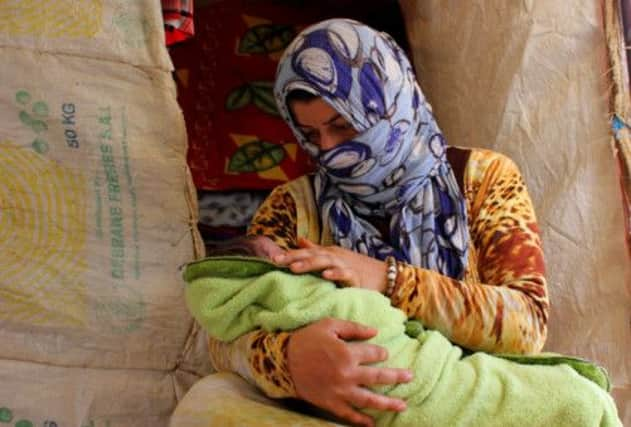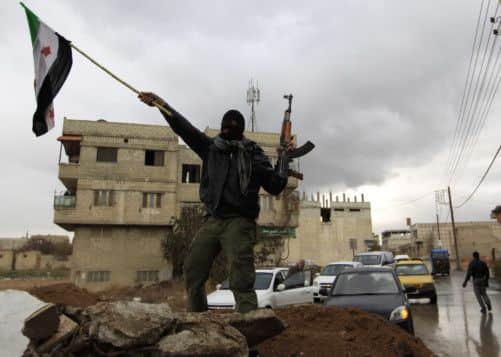Syria: A deep humanitarian catastrophe


They flee with nothing but the clothes on their backs – many traumatised by the horrific violence they have experienced. Now they are homeless, often grieving for the loss of their previous peaceful lives and the death of their children, parents or wider family.
This is the situation for the ever-increasing Syrian refugee population as people flee for their lives over the borders into neighbouring countries such as Lebanon, Jordan and Turkey.
Advertisement
Hide AdAdvertisement
Hide AdI spent time recently with families in Tripoli, Bekaa Valley and Saida in Lebanon as I visited various emergency projects funded by the Scottish Catholic International Aid Fund (SCIAF) to help refugees in Lebanon and Jordan. The individual stories of suffering are harrowing and their outlook bleak.


One woman, Shaha Ibrahim, was four months pregnant when she fled with her husband and first child. Her new baby girl, Bayane, is now just two months old. Like many others, Shaha has lost family: “My two cousins were killed in a bombing. We ran away from our home, but our cousins didn’t make it.”
Her husband, Abboud, described the scene before they fled: “We could see the bombs falling and the buildings on fire around us. There were so many dead bodies and body parts in the street. A lot of our neighbours were killed or injured by shrapnel.
“When we saw the bodies, we thought we would be next. We ran from one place to the next, but didn’t even have food – our children were starving.”
Immense struggle of Syrian refugees
Once over the border, the plight of Syrian refugees remains one of immense struggle. The conditions many families find themselves in are appalling. There are no official refugee camps in Lebanon, so they have to find shelter wherever they can – in derelict buildings and temporary shelters made from waste.
Some families are extremely vulnerable. I spoke to Ahmad Salameh, who had been living with his wife, children, and five other families in a cow shed with a pipe leaking human waste into it. This is where they had been sheltering, sleeping and eating. The space was about three metres by five metres. The other five families were all headed by his sisters-in-law as two of his brothers had been killed and three remained in Syria. Fortunately, Ahmad and his extended family have now built a shelter on land they are renting nearby. It is cleaner and they have more space. There is less illness in the family and it is a little warmer.
These are the people to whom SCIAF and its sister agency Caritas Lebanon are providing aid. Ahmad and his wider family received food, blankets and mattresses. Others receive hygiene kits – including soap, cloths, nappies – medical care, trauma counselling, fuel, stoves, school fees, uniforms and books for children and rent vouchers, depending on their situation. As the horrific war in Syria continues, the problems are set to deteriorate further as between 3,000 and 4,000 new refugees cross the border into Lebanon every day.
Put simply, there isn’t enough emergency aid for the growing number of refugees. Syrians now make up around 25 per cent of the country’s population, with conservative estimates of refugees at 1.1 million with a Lebanese population of four million. It is easy to imagine the enormous impact the Syrian war and refugee crisis is having on Lebanon.
Continued support for Syrians and Lebanese
Advertisement
Hide AdAdvertisement
Hide AdThere are also many poor and vulnerable Lebanese families who need help. There is a shortage of cheap rental accommodation, food prices are rising, there are growing waiting lists for schools and unemployment and crime are soaring. With such an intense scramble for resources, the prospect of civil unrest between the refugees and their hosts is a very real possibility, with isolated trouble already occurring.
Fantastic work is being done by SCIAF’s partners on the ground, working alongside other charities and the UNHCR. But the needs remain great. That is why it is more important than ever that we continue to support the Syrian refugees and their host communities.
This is a deep humanitarian catastrophe and no-one should be fooled into thinking that it cannot get worse. It can – and it will be the innocent and desperate refugees and their hosts in neighbouring countries who will suffer. Now is a time for action.
• Val Morgan is SCIAF’s communications and media officer, www.sciaf.org.uk